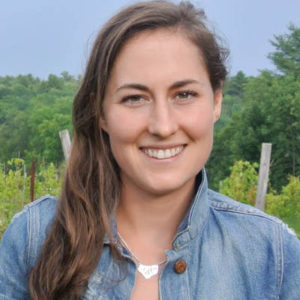
I first became a “chef” when I was 3 years old. My mom was making pancakes, and I was helping in my own unique way — by grabbing the mixing bowl and spoon, and sitting under our kitchen table to stir the batter.
Growing up, food was a central part of my life. It brought my family together after our jampacked days of school, work, and sports practices, and on weekends often included extended family. Every Christmas meant baking cookies with my mom, and birthdays were the time to pull out the dogeared cookbook with my favorite cupcake-and-vanilla-icing recipe. I was always looking for excuses to bake and cook, inventing pancake recipes spiced with an overload of cinnamon and turning a lemonade stand into my own personal popup café, complete with 4 types of cookies, brownies, and banana bread.
I loved experimenting with unique ingredients, yet never gave much thought to where my ingredients were coming from.
At Colorado College, I had my first introduction to the concept of local food and sustainable sourcing. Growing up, I knew that the best tomatoes came from the summer farmers market and that apple picking in the fall led to great apple pie, but I had never thought about the environmental or economic impacts of enjoying seasonal food. When I stepped into Rastall Café, managed by Bon Appétit, I noticed all of the information posted about where ingredients were coming from and I remember being amazed and excited by the knowledge I was gaining, just by eating dinner!
A different perspective
I was privileged to have access to that information, a fact that I became deeply aware of when I travelled abroad to Spain during the spring of my junior year. I headed to Barcelona with an open mind, excited to experience the homestay option I had selected. Friends shared stories of amazing experiences, bonding with their host family over lovingly prepared dinners unique to the culture and in turn cooking meals for their hosts, to share pieces of their own culture. I was not so lucky.
During my days in Barcelona I would wander the huge outdoor markets, snacking on dates and fresh fruit, and trying bocadillos made with jamon and manchego. In the evenings, I would head home for dinner prepared by our host, who had no love for food or cooking. Our bleak meals stood in stark contrast to the colorful markets I explored by day. Many nights we ate thick spaghetti noodles with a side of canned tomato paste and a grayish mystery meat. We weren’t allowed to use the kitchen or purchase any ingredients for the meals.
I was being fed, but I didn’t have any input or agency in the food I ate. I longed for a kitchen and scoured food blogs, imagining what I would make when I returned home. I realized how lucky I had been to grow up with access to a kitchen and fresh food, and to have a family that allowed me to experiment and make a mess in the kitchen. I wanted to share the passion I had for food and cooking with others, especially students.
Planting seeds of food awareness
A year after graduating, after a stint at a guest ranch and working as a pastry chef, I applied to FoodCorps, the national nonprofit that serves vulnerable public-school children by improving their access to healthy and affordable food (and the recipient of Bon Appétit’s 2013 annual gift).
In the communities of Billings, MT, and Salem, OR, during my 2 years with FoodCorps, I worked daily with teachers, students, parents, local farmers, and government leaders to enact changes that would support local food access in the community. I taught more than a dozen elementary and middle school classes in gardening and culinary arts and developed curriculum matched to both Common Core and Next Generation Science Standards. I developed a deep knowledge of worms and worm composting, built and cultivated my first garden, and spent afternoons with my cooking club making everything from green smoothies to homemade corn tortillas.
During my time with FoodCorps I was also exposed to the difficulties of local procurement, especially when purchasing for a large school district with a set menu. I went in with bright ideas about working with food service directors thrilled to shift their menus to feature more locally grown produce, of purchasing local apples. I quickly learned that school food service is a land of food contracts, very limited budgets, and regulation apple sizes. I continued to push for more local products, but focused on getting my students excited about the vegetables and fruits they could find daily in the school salad bar. There was no easy solution to the procurement challenges, yet I was encouraged every day by the excitement and wonder my students displayed each time we pulled a carrot from the earth or tried a new recipe.
My mind constantly turned back to my experiences with Bon Appétit at Colorado College, proof that local and sustainable could exist in food service. I wondered how they did it, and what motivated them? Many of the people I had spoken with in school food seemed disenchanted or simply tired: they agreed local procurement sounded nice, but it was just too difficult, complicated, expensive … the list went on and on. I’m sure that many Bon Appétiters would agree that pushing for sustainable food sources is all of the above — reimagining a well established system is hard! Yet they continue to fight for change, using the company’s size and influence to enact the changes that our food system so desperately needs.
I am so excited to be joining such a motivated team as a Fellow! I look forward to continuing to educate myself and others in they ways that we can care for ourselves and the world around us, by pushing for a sustainable and delicious food system.